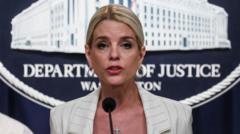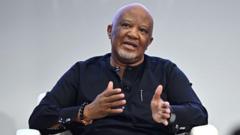As President Donald Trump prepares for his meeting with Jordan's King Abdullah at the White House today, tensions are palpable over Trump's contentious proposal to relocate Gaza's population to Jordan amidst ongoing conflict in the region. This meeting marks the first direct confrontation over Trump's plans, which include the controversial notion of removing Palestinians from their homeland and settling them in Jordan and Egypt without the right of return – an assertion that breaches international law.
Trump Faces Opposition from Jordan's King Abdullah Over Controversial Gaza Proposal

Trump Faces Opposition from Jordan's King Abdullah Over Controversial Gaza Proposal
In a high-stakes meeting, President Trump proposes relocating Gaza's population, igniting backlash from Jordan's leadership amidst regional tensions.
Jordan, a significant US ally, faces pressure from both its internal populace and external diplomatic obligations. The nation has long hosted numerous Palestinian refugees, including those from Gaza who currently reside in crowded refugee camps like the one in Jerash. Former residents of Gaza express adamant opposition to the plan, viewing any relocation as a betrayal of their rights, particularly the historic 'right of return' to their ancestral lands. “We Gazans have been through this before,” says Yousef, a camp resident. “Back then, they told us it would be temporary, and we would return to our home. The right to return is a red line.”
The fabric of Jordanian society is also under strain due to the influx of refugees from Iraq and Syria, with many native Jordanians attributing high unemployment and economic difficulties to these waves of migration. Day laborers in central Amman express fear and frustration over job scarcity and the prospect of more refugees arriving from Gaza. “If Gazans come, we will die,” says Imad Abdallah, a laborer searching for work to feed his family.
King Abdullah is expected to deliver a firm message to Trump, stating that any forceful push of displaced people into Jordan would be viewed as a declaration of war. Former deputy prime minister Jawad Anani asserts that the lack of trust in Israel's intentions complicates the situation further. Any movement of Gazans, even if proposed as voluntary, faces significant skepticism.
As protests against the plan erupted in Jordan, the repercussions of Trump's Gaza strategy could destabilize this strategically vital ally, which serves as a buffer in the volatile Middle East. Analysts argue that the potential unrest in Jordan represents a serious threat not only to the country, but also to its allies, including the US and Israel, emphasizing the delicate balance Jordan must maintain amidst emerging pressures.
The ongoing conflict and the complexities of Jordan's refugee situation continue to shape both national policy and public sentiment, presenting intricate challenges as US foreign policy shifts under Trump's administration.
Overall, Jordan remains a critical but vulnerable player in the regional geopolitical landscape, with its stability key not only to its own future but also to broader international concerns in the Middle East.
The fabric of Jordanian society is also under strain due to the influx of refugees from Iraq and Syria, with many native Jordanians attributing high unemployment and economic difficulties to these waves of migration. Day laborers in central Amman express fear and frustration over job scarcity and the prospect of more refugees arriving from Gaza. “If Gazans come, we will die,” says Imad Abdallah, a laborer searching for work to feed his family.
King Abdullah is expected to deliver a firm message to Trump, stating that any forceful push of displaced people into Jordan would be viewed as a declaration of war. Former deputy prime minister Jawad Anani asserts that the lack of trust in Israel's intentions complicates the situation further. Any movement of Gazans, even if proposed as voluntary, faces significant skepticism.
As protests against the plan erupted in Jordan, the repercussions of Trump's Gaza strategy could destabilize this strategically vital ally, which serves as a buffer in the volatile Middle East. Analysts argue that the potential unrest in Jordan represents a serious threat not only to the country, but also to its allies, including the US and Israel, emphasizing the delicate balance Jordan must maintain amidst emerging pressures.
The ongoing conflict and the complexities of Jordan's refugee situation continue to shape both national policy and public sentiment, presenting intricate challenges as US foreign policy shifts under Trump's administration.
Overall, Jordan remains a critical but vulnerable player in the regional geopolitical landscape, with its stability key not only to its own future but also to broader international concerns in the Middle East.






















